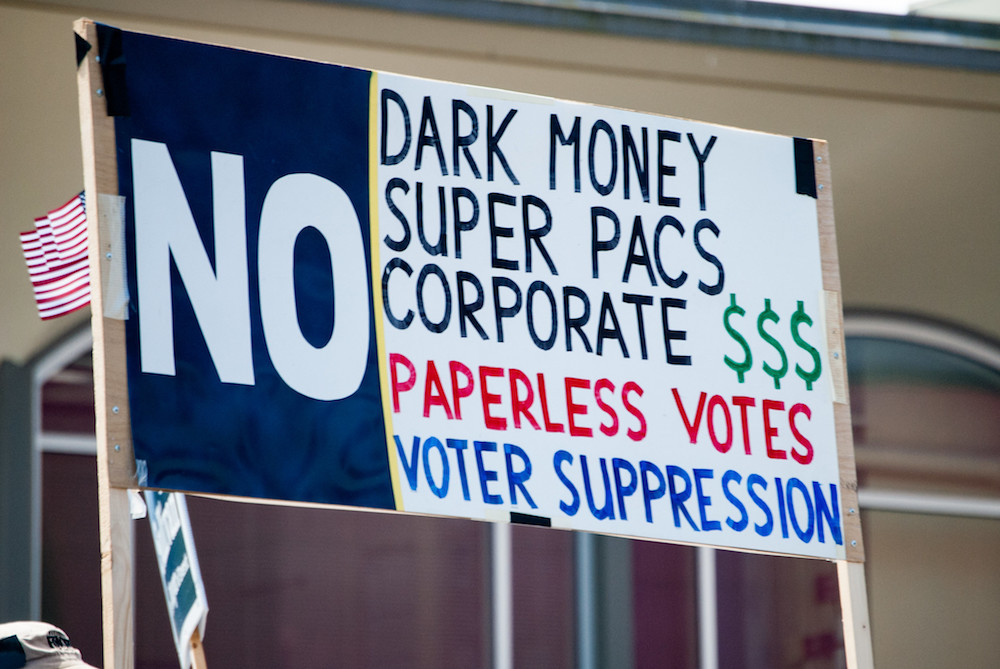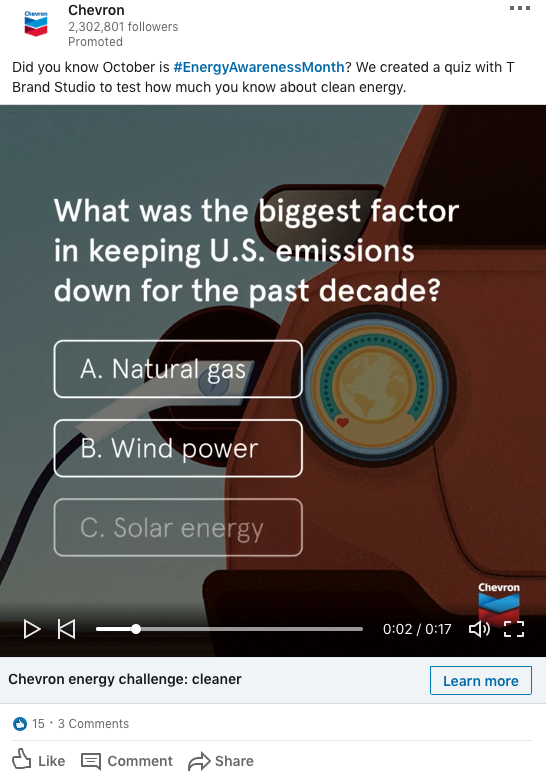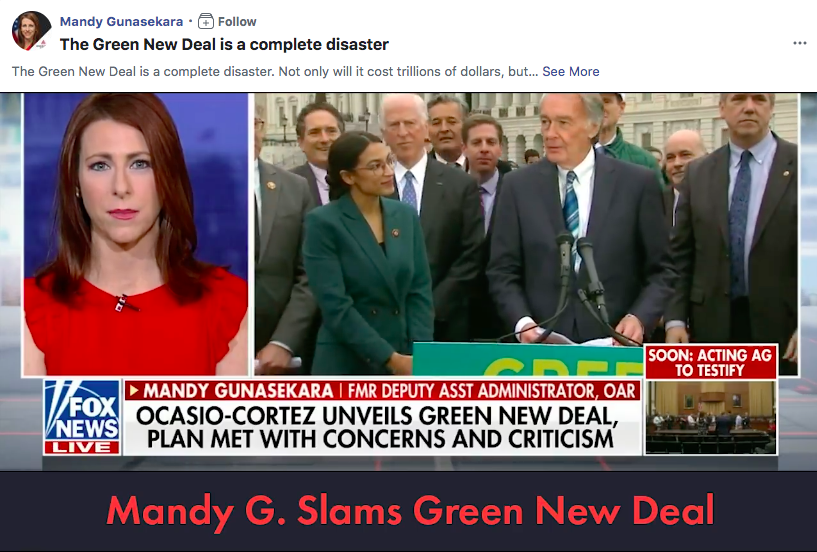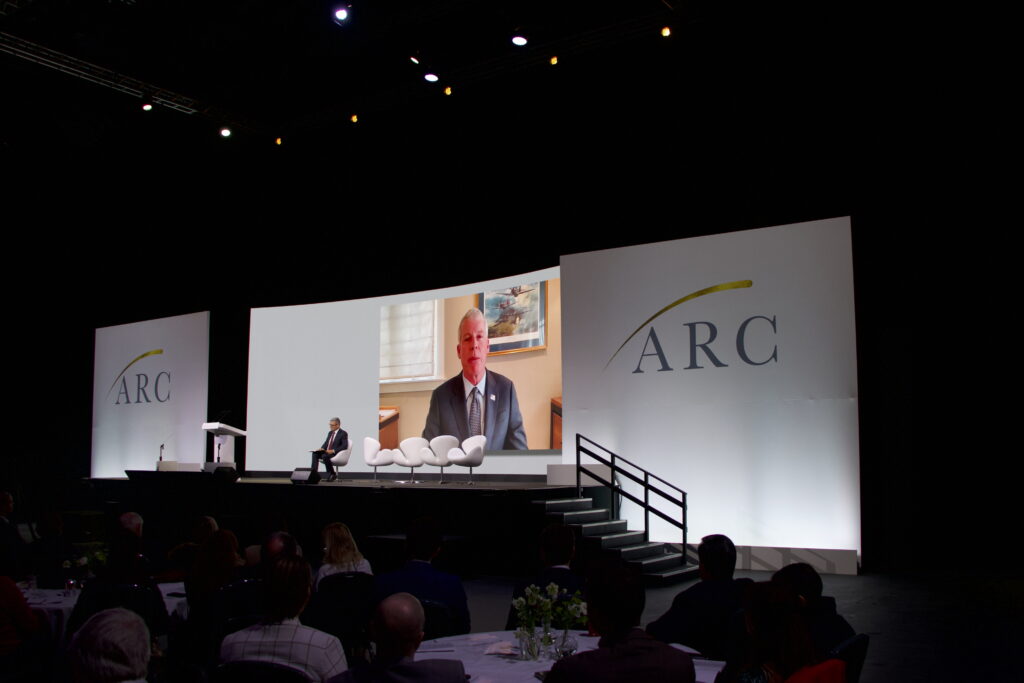Amid the crescendo of calls for climate action and rising rage directed at the fossil fuel industry, petroleum producers and their allies are engaging in an aggressive promotional push focused on natural gas. The same month that the American Petroleum Institute (API) started running ads emphasizing gas’s role in reducing carbon emissions, a new dark money group has launched under the patriotic guise of promoting “America’s energy independence” by promoting, you guessed it, natural gas.
That group, called The Empowerment Alliance (TEA), is a registered 501(c)4 that does not disclose its donors (and is not required to under law). TEA launched on September 30 with a news release filled with natural gas industry talking points and attacks on the Green New Deal. The organization describes natural gas as “essential to our shared prosperity” in terms of jobs, national security, energy costs, and even air quality, while the Green New Deal is labeled as “radical and unachievable” and a “risky tax scheme.”
This anonymously funded organization, from its leaders to its messaging, is part of a broader chorus of misleading talking points that goes beyond the “natural gas and oil” industry (as the API ads say) to conservative media pundits and top strategists and officials within the Trump administration and the GOP.
Key Players and Plans
The Empowerment Alliance is known to be run by two top figures and lobbyists for the Republican Party.
James Nathanson, the executive director, is a longtime Republican operative and apparent dark money extraordinaire. Nathanson’s business consulting firm in Dayton, Ohio, James S. Nathanson & Associates, has funded various conservative candidates and Republican Party groups and SuperPACs. But while these donations are transparent, Nathanson has also headed a group called Freedom Vote, Inc. — another 501(c)(4) dark money organization. Freedom Vote (FV) has been accused of failing to report more than $1.1 million spent on political attack ads during the 2016 U.S. Senate race in Ohio.
Watchdog group Citizens for Responsibility and Ethics in Washington (CREW) filed official complaints against Freedom Vote to the IRS and Federal Election Commission (FEC), and even filed a lawsuit in June seeking to compel the FEC to take enforcement action against the organization. Nathanson was also a central subject to a 2004 complaint to the FEC for violating campaign finance law in Ohio election campaigns.
Terry Holt, partner at the PR firm HDMK, is TEA’s communications director and spokesman. He was senior communications strategist for the George W. Bush presidential campaigns and has worked for former House Speaker John Boehner. According to his HDMK profile, he has “provided long-term communications and media strategy for several chief executives at leading trade associations and corporations.” Notably, HDMK was hired in 2010 to do communications and PR for the American Coalition for Clean Coal Electricity (ACCCE), a coal industry lobby group.
HDMK boasts on its website about its work to build localized support for expanding big energy infrastructure: “To reset the conversation about the construction of energy infrastructure at the national level, HDMK built a grassroots coalition of workers, small and medium sized businesses, civic leaders, unions, and other local supporters. By activating local supporters and giving them a voice at the national level, we created favorable news coverage during the heated debate about the expansion of America’s energy infrastructure.”
The Empowerment Alliance appears poised to undertake this same industry-funded “grassroots” strategy. Holt told Politico the group plans to “run ads, engage in grassroots work and reach out to the media and may set up a lobbying operation down the road.” The group’s anonymous donors are hoping it will be a “significant factor” in the 2020 election.
The group also revealed that it intends to “mount an aggressive fundraising campaign in the coming months with plans to announce a formal leadership structure and new initiatives before the end of the year.” TEA has started running paid ads on Facebook spending a total of more than $8,000 so far.
Anonymous Donors?
An anti-dark money sign at a 2017 parade in Washington state. Credit: Cindy Shebley, CC BY 2.0
TEA says it intends to “engage the American people in an open and honest dialogue” and decries the “billionaire mega donors” and “deep pockets” supporting policies to curb fossil fuel production. Yet the organization is notably opaque about its own funding sources and donors. TEA explicitly states its “policy is to not disclose its donors to the general public.” It also clarifies that there are no limits on donation amounts “by an individual, corporation, union, or trade association.” In other words, unlimited dark money is welcome.
Holt explained to Politico that the group’s donors are kept secret to protect them from opposition and protesters. And as E&E News reported, Holt also claimed donors feared safety risks from anti-fossil fuel activists, or as he called them — “eco-terrorists”: “Because of violence and trespassing and other criminal behavior, the Empowerment Alliance is going to protect its donors from that kind of risk,” he said. “We are offering donors this protection out of the concern that we would have should they come forward and the scrutiny of some of these eco-terrorists.”
Oil and gas industry veteran David Blackmon (who was involved in creating petroleum advocacy groups Energy In Depth and the American Natural Gas Alliance) praised TEA for “filling a void” left by the industry itself, but questioned why the industry wasn’t promoting and advocating for itself.
“However, it remains a wonder why the companies whose bottom lines depend on increasing the use of natural gas in this economy aren’t mounting a well-funded national effort of their own,” said Blackmon. Blackmon noted TEA’s lack of transparency invites skepticism and negative perceptions: “But the desire to hold its list of contributors confidential also opens TEA up to being labeled a ‘dark money’ operation in media reports, with all the attendant negative news coverage and public perceptions that inevitably come along with that designation.”
Gaslighting and the Green New Deal
One of the primary objectives of the Empowerment Alliance is attacking the comprehensive climate policy framework known as the Green New Deal. TEA seems to be pushing natural gas as some kind of Green New Deal alternative, its answer to energy security, economic growth, and climate change concerns.
This narrative contradicts the scientific reality of the climate crisis — which the United Nations says requires “rapid, far-reaching and unprecedented changes in all aspects of society.”
As Bill McKibben recently wrote in the New Yorker, “Many of [the gas defenders] will say that, thanks to natural gas, our ‘emissions’ have declined. But that will be the most literal gaslighting imaginable, a lie of real gravity.”
A Chevron ad on LinkedIn promotes a common industry talking point about natural gas and reducing U.S. carbon emissions.
The fracking boom has led to an explosion in natural gas production over the past decade, contributing to the decline of coal power — as well as a decline in U.S. carbon dioxide emissions — as gas power plants have popped up. While burning natural gas releases fewer pollutants than burning coal, natural gas is comprised almost entirely of the potent greenhouse gas methane, and leaks in gas systems and industry venting and flaring are common. After accounting for these leaks, researchers at Cornell University have warned that fracked gas may be even worse for the climate than coal.
In contrast to TEA and industry messaging, U.S. carbon dioxide emissions actually rose last year by 3.4 percent, which included a nearly 2 percent increase in power-sector emissions. According to a 2019 report spearheaded by Oil Change International, continued oil and gas exploitation from new reserves could result in new carbon pollution equivalent to building nearly 1,000 coal-fired power plants.
Echoes of Industry
Nevertheless, conservative media and officials and associates of the Trump administration repeat these kinds of myths early and often. While some right-wing attacks on serious climate plans are clearly hyperbolic, like the false claim that Green New Deal proponents want to ban hamburgers or air travel, others are more cautiously veiled in concerns around economic impacts.
For example, the acting director of the Bureau of Land Management, William Perry Pendley, recently told a room full of environmental journalists that resource extraction is deeply tied to the region’s economy and jobs, calling it a “life or death issue” for communities. While oil and gas does have a heavy economic presence in the region, that framing downplays the ways fracking has also devastated local communities with documented negative health and safety impacts.
BLM Acting Director William Perry Pendley addresses questions at #SEJ2019 today regarding the BLM‘s management of more than 245 million acres of public lands. pic.twitter.com/wQQAfujgjm
— BLMNational (@BLMNational) October 11, 2019
And Dina Gilio-Whitaker, an Indigenous studies scholar and member of the Colville Confederated Tribes, countered Pendley, pointing to the massive social impact of “man camps” in booming oil and gas fields, which have led to the exploitation and abuse of women.
Pendley also said that a “keep it in the ground” policy for fossil fuels would be “absolutely insane.” But that is in fact a prescription from scientists and experts analyzing the impact of fossil fuel exploitation on the carbon budget, with the goal of avoiding catastrophic climate disruption.
Former Trump EPA official and current pro-Trump dark money group founder, Mandy Gunasekara attacked the Green New Deal resolution on Fox News. Credit: Fox News via Mandy Gunasekara on Facebook
Speaking at the same conference, former Trump Environmental Protection Agency (EPA) official and founder of the pro-Trump 501(c)(4) Energy 45 Fund, Mandy Gunasekara also defended oil and gas, echoing the industry message about natural gas reducing emissions. Gunasekara, who was the aide that handed a snowball to Sen. James Inhofe during his infamous climate science denial speech on the Senate floor, claimed that climate proposals like the Green New Deal or carbon pricing are “premised on making energy more expensive.” This prompted fellow panelist Heather McTeer Toney of Moms Clean Air Force (and a regional EPA administrator under Obama) to push back.
“That is not true,” Toney said. “It’s information like that that gets put into the sphere of voters all over this country, and they believe rhetoric.” She explained that higher energy costs are the result of energy companies passing along their costs to consumers. “It’s that little piece you leave out about what’s really going on and does not connect all the dots,” Toney said.
The key, she added, is figuring out a way to not pass these costs on to ratepayers, “so that people are not paying for it and our children are not paying for it, and we stop lying to the American public.”
Like TEA, Gunasekara’s Energy 45 group does not disclose its donors, but the talking points coming from these dark money groups sound like a perfect echo of the oil and gas industry itself.
Main image: Screenshot from a promotional video by The Empowerment Alliance
Subscribe to our newsletter
Stay up to date with DeSmog news and alerts










